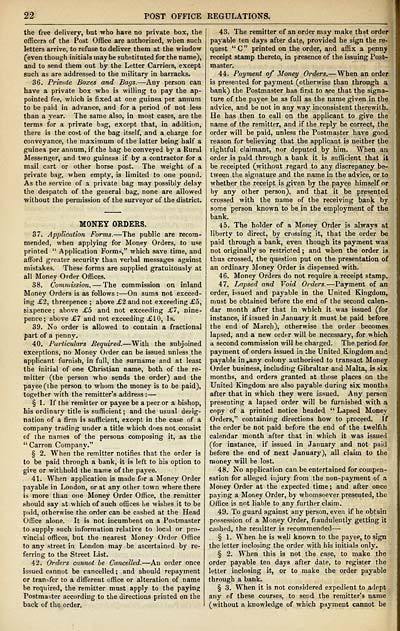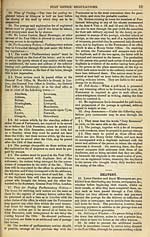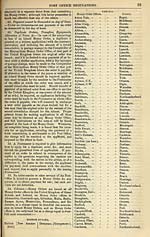Download files
Complete book:
Individual page:
Thumbnail gallery: Grid view | List view

22
POST OFFICE REGULATIONS.
the free delivery, but who have no private box, the
officers of the Post Office are authorized, when such
letters arrive, to refuse to deliver them at the window
(even though initials maybe substituted for the name),
and to send them out by the Letter Carriers, except
such as are addressed to the military in barracks.
36. Private Boxes and Bags. — Any person can
have a private box who is willing to pay the ap-
pointed fee, which is fixed at one guinea per annum
to be paid in advance, and for a period of not less
than a year. The same also, in most cases, are the
terms for a private bag, except that, in addition,
there is the cost of the bag itself, and a charge for
conveyance, the maximum of the latter being half a
guinea per annum, if the bag be conveyed b}' a Rural
Messenger, and two guineas if by a contractor for a
mail cart or other horse post. The weight of a
private bag, when empty, is limited to one pound.
As the service of a private bag may possibly dela)'
the despatch of the general bag, none are allowed
without the permission of the surveyor of the district.
MONEY ORDERS.
37. Application Forms. — The public are recom-
mended, when applying for Money Orders, to use
printed " Application Forms," which save time, and
afford greater security than verbal messages against
mistakes. These forms are supplied gratuitously at
all Money Order Offices.
38. Commission. — The commission on inland
Money Orders is as follows : — On sums not exceed-
ing £2, threepence ; above £2 and not exceeding £5,
sixpence; above £5 and not exceeding £7, nine-
pence; above £7 and not exceeding £10, Is.
39. No order is allowed to contain a fractional
part of a penny.
40. Particulars Required. — With the subjoined
exceptions, no Money Order can be issued unless the
applicant furnish, in full, the surname and at least
the initial of one Christian name, both of the re-
mitter (the person who sends the order) and the
payee (the person to whom the money is to be paid),
together with the remitter's address : —
§ 1. If the remitter or payee be a peer or a bishop,
his ordinarj' title is sufficient ; and the usual desig-
nation of a firm is sufficient, except in the case of a
company trading under a title which does not consist
of the names of the persons composing it, as the
" Carron Company."
§ 2. When the remitter notifies that the order is
to be paid through a bank, it is left to his option to
give or withhold the name of the payee.
41. When application is made for a Money Order
payable in London, or at any other town where there
is more than one Money Order Office, the remitter
should say at which of such offices he wishes it to be
paid, otherwise the order can be cashed at the Head
Office alone. It is not incumbent on a Postmaster
to supply such information relative to local or pro-
vincial offices, but the nearest Money Order Office
to any street in London may be ascertained by re-
ferring to the Street List.
42. Orders cannot be Cancelled. — An order once
issued cannot be cancelled ; and should repayment
or tran.->fer to a different office or alteration of name
be required, the remitter must apply to the paying
Postmaster according to the directions printed on the
back of the order.
43. The remitter of an order may make that order
payable fen days after date, provided he sign the re-
quest " C " printed on the order, and affix a penny
receipt stamp thereto, in presence of the issuing Post-
master.
44. Payment of Money Orders. — When an order
is presented for payment (otherwise than throtigh a
bank) the Postmaster has first to see that the signa-
ture of the payee be as full as the name given in the
advice, and be not in any way inconsistent therewith.
He has then to call on the applicant to give the
name of the remitter, and if the replj' be correct, the
order will be paid, unless the Postmaster have good
reason for believing that the applicant is neither the
rightful claimant, nor deputed hy him. When an
order is paid through a bank it is sufficient that it
be receipted (without regard to any discrepancy be-
tween the signature and the name in the advice, or to
whether the receipt is given by the payee himself or
by any other person), and that it be presented
crossed with the name of the receiving bank by
some person known to be in the employment of the
bank.
45. The holder of a Money Order is always at
liberty to direct, by crossing it, that the order be
paid through a bank, even though its payment was
not originally so restricted ; and when the order ia
thus crossed, the question put on the presentation of
an ordinary Money Order is dispensed with.
46. Money Orders do not require a receipt stamp.
47. Lapsed and Void Orders. — Payment of an
order, it^sued and payable in the United Kingdom,
must be obtained before the end of the second calen-
dar month after that in which it was issued (for
instance, if issued in January it must be paid before
the end of March), otherwise the order becomes
lapsed, and a new order will be necessary, for which
a second commission will be charged. The period for
paj'ment of orders issued in the United Kingdom and
payable in .any colony authorised to transact Money
Order business, including Gibraltar and Malta, is six
months, and orders granted at those places on the
United Kingdom are also paj'able during six months
after that in which they were issued. Any person
presenting a lapsed order will be furnished with a
copy of a printed notice headed " Lapsed Money
Orders," containing directions how to proceed. If
the order be not paid before the end of the twelfth
calendar month after that in which it was issued
(for instance, if issued in January and not paid
before the end of next January), all claim to the
money will be lost.
48. No application can be entertained for compen-
sation for alleged injury from the non-payment of a
Money Order at the expected time ; and after once
paying a Money Order, by whomsoever presented, the
Office is not liable to any further claim.
49. To guard against any person, even if he obtain
possession of a Money Order, fraudulentU' getting it
cashed, the remitter is recommended —
§ 1. When he is well known to the payee, to sign
the letter inclosing the order with his initials only.
§ 2. When this is not the case, to make the
order payable ten days after dale, to register the
letter inclosing it, or to make the order payable
through a bank.
§ 3. When it is not considered expedient to adopt
any of these courses, to send the remitter's name
(without a knowledge of which payment cannot be
POST OFFICE REGULATIONS.
the free delivery, but who have no private box, the
officers of the Post Office are authorized, when such
letters arrive, to refuse to deliver them at the window
(even though initials maybe substituted for the name),
and to send them out by the Letter Carriers, except
such as are addressed to the military in barracks.
36. Private Boxes and Bags. — Any person can
have a private box who is willing to pay the ap-
pointed fee, which is fixed at one guinea per annum
to be paid in advance, and for a period of not less
than a year. The same also, in most cases, are the
terms for a private bag, except that, in addition,
there is the cost of the bag itself, and a charge for
conveyance, the maximum of the latter being half a
guinea per annum, if the bag be conveyed b}' a Rural
Messenger, and two guineas if by a contractor for a
mail cart or other horse post. The weight of a
private bag, when empty, is limited to one pound.
As the service of a private bag may possibly dela)'
the despatch of the general bag, none are allowed
without the permission of the surveyor of the district.
MONEY ORDERS.
37. Application Forms. — The public are recom-
mended, when applying for Money Orders, to use
printed " Application Forms," which save time, and
afford greater security than verbal messages against
mistakes. These forms are supplied gratuitously at
all Money Order Offices.
38. Commission. — The commission on inland
Money Orders is as follows : — On sums not exceed-
ing £2, threepence ; above £2 and not exceeding £5,
sixpence; above £5 and not exceeding £7, nine-
pence; above £7 and not exceeding £10, Is.
39. No order is allowed to contain a fractional
part of a penny.
40. Particulars Required. — With the subjoined
exceptions, no Money Order can be issued unless the
applicant furnish, in full, the surname and at least
the initial of one Christian name, both of the re-
mitter (the person who sends the order) and the
payee (the person to whom the money is to be paid),
together with the remitter's address : —
§ 1. If the remitter or payee be a peer or a bishop,
his ordinarj' title is sufficient ; and the usual desig-
nation of a firm is sufficient, except in the case of a
company trading under a title which does not consist
of the names of the persons composing it, as the
" Carron Company."
§ 2. When the remitter notifies that the order is
to be paid through a bank, it is left to his option to
give or withhold the name of the payee.
41. When application is made for a Money Order
payable in London, or at any other town where there
is more than one Money Order Office, the remitter
should say at which of such offices he wishes it to be
paid, otherwise the order can be cashed at the Head
Office alone. It is not incumbent on a Postmaster
to supply such information relative to local or pro-
vincial offices, but the nearest Money Order Office
to any street in London may be ascertained by re-
ferring to the Street List.
42. Orders cannot be Cancelled. — An order once
issued cannot be cancelled ; and should repayment
or tran.->fer to a different office or alteration of name
be required, the remitter must apply to the paying
Postmaster according to the directions printed on the
back of the order.
43. The remitter of an order may make that order
payable fen days after date, provided he sign the re-
quest " C " printed on the order, and affix a penny
receipt stamp thereto, in presence of the issuing Post-
master.
44. Payment of Money Orders. — When an order
is presented for payment (otherwise than throtigh a
bank) the Postmaster has first to see that the signa-
ture of the payee be as full as the name given in the
advice, and be not in any way inconsistent therewith.
He has then to call on the applicant to give the
name of the remitter, and if the replj' be correct, the
order will be paid, unless the Postmaster have good
reason for believing that the applicant is neither the
rightful claimant, nor deputed hy him. When an
order is paid through a bank it is sufficient that it
be receipted (without regard to any discrepancy be-
tween the signature and the name in the advice, or to
whether the receipt is given by the payee himself or
by any other person), and that it be presented
crossed with the name of the receiving bank by
some person known to be in the employment of the
bank.
45. The holder of a Money Order is always at
liberty to direct, by crossing it, that the order be
paid through a bank, even though its payment was
not originally so restricted ; and when the order ia
thus crossed, the question put on the presentation of
an ordinary Money Order is dispensed with.
46. Money Orders do not require a receipt stamp.
47. Lapsed and Void Orders. — Payment of an
order, it^sued and payable in the United Kingdom,
must be obtained before the end of the second calen-
dar month after that in which it was issued (for
instance, if issued in January it must be paid before
the end of March), otherwise the order becomes
lapsed, and a new order will be necessary, for which
a second commission will be charged. The period for
paj'ment of orders issued in the United Kingdom and
payable in .any colony authorised to transact Money
Order business, including Gibraltar and Malta, is six
months, and orders granted at those places on the
United Kingdom are also paj'able during six months
after that in which they were issued. Any person
presenting a lapsed order will be furnished with a
copy of a printed notice headed " Lapsed Money
Orders," containing directions how to proceed. If
the order be not paid before the end of the twelfth
calendar month after that in which it was issued
(for instance, if issued in January and not paid
before the end of next January), all claim to the
money will be lost.
48. No application can be entertained for compen-
sation for alleged injury from the non-payment of a
Money Order at the expected time ; and after once
paying a Money Order, by whomsoever presented, the
Office is not liable to any further claim.
49. To guard against any person, even if he obtain
possession of a Money Order, fraudulentU' getting it
cashed, the remitter is recommended —
§ 1. When he is well known to the payee, to sign
the letter inclosing the order with his initials only.
§ 2. When this is not the case, to make the
order payable ten days after dale, to register the
letter inclosing it, or to make the order payable
through a bank.
§ 3. When it is not considered expedient to adopt
any of these courses, to send the remitter's name
(without a knowledge of which payment cannot be
Set display mode to: Large image | Transcription
Images and transcriptions on this page, including medium image downloads, may be used under the Creative Commons Attribution 4.0 International Licence unless otherwise stated. ![]()
| Scottish Post Office Directories > Towns > Glasgow > Post-Office annual Glasgow directory > 1867-1868 > (754) |
|---|
| Permanent URL | https://digital.nls.uk/84160079 |
|---|
| Description | Directories of individual Scottish towns and their suburbs. |
|---|
| Description | Around 700 Scottish directories published annually by the Post Office or private publishers between 1773 and 1911. Most of Scotland covered, with a focus on Edinburgh, Glasgow, Dundee and Aberdeen. Most volumes include a general directory (A-Z by surname), street directory (A-Z by street) and trade directory (A-Z by trade). |
|---|


